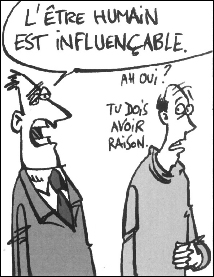In my opinion, the sciences (currently) useful “to advance schmilblick” are the sciences of the form of the message (cognitive sciences?), and not the sciences of the content of the message… Questions of (im)postures? Hence the usefulness of a guide for zeteticians in society, based on principles to be used for respectful communication between people.
The guide with a “little memo” style offers questions, behaviors, postures to follow during a discussion or debate (social issues, science, etc.). The idea was suggested to me during a discussion on the form of the message in science.
The memo in questions
Am I willing to modify and adjust my position, even if the subject is well known, dense, seemingly trivial, obscure…?
Am I ready to really listen (not just the words)?
What will be the way of presenting the arguments according to one point of view, according to the point of view of another person, according to my point of view?
Will I refrain from criticizing the person or assuming their ulterior motives and just evaluate their arguments?
Where will I look for the sources?
How will I present my arguments? With a particular order or disorder?
Why do gray areas occur?
Why can we get to the Godwin point?
Sonia Kanclerski, Pause-café chez Sonia, Guide for zeteticians in society.














